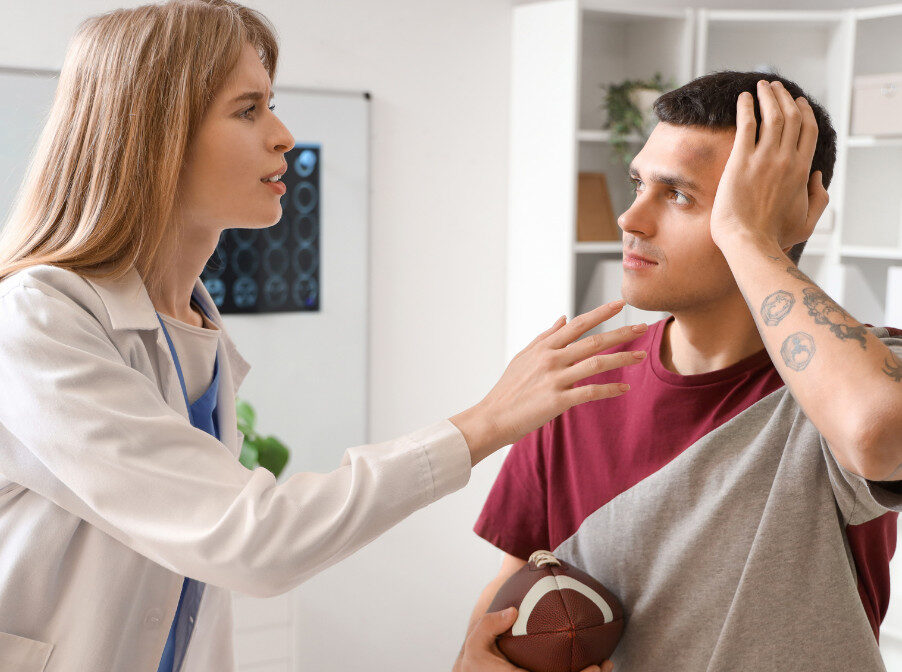A concussion is a type of traumatic brain injury (TBI) caused by a knock to the head or a hit to the body. The blow to the head or body can cause the brain to rapidly move around within the skull, resulting in changes in the brain and, at times, damaging brain cells.
Symptoms
The signs and symptoms of a concussion may be delayed and subtle but can continue for days, weeks, or even longer. Anyone who suffers a head injury followed by any of these symptoms at the time of injury or within 24 hours should be evaluated in an emergency room or hospital.
Physical signs and symptoms:
- Worsening or severe headache
- Ringing in the ears
- Nausea and vomiting
- Fatigue or drowsiness
- Blurry vision or difficulty with eye movements
- Confusion
- Weakness, numbness, slurred speech
- Seizure
- Discharge of clear fluid or blood from the nose or ears
- Memory loss or amnesia, particularly forgetting the incident that caused the concussion
A bystander may notice the following signs and symptoms:
- Brief loss of consciousness (this doesn’t always occur)
- Delayed response to questions
- Unusual behavior, confusion, or disorientation at the time of or after injury
- Dazed appearance
- Forgetfulness (repeatedly asking the same question)
In young children:
Head trauma is common in young children, but concussions can be tricky to recognize in infants and toddlers since they can’t explain how they feel. Some physical clues may include:
- Dazed appearance
- Irritability or crankiness
- Loss of balance and unsteady walking
- Excessive crying
- Change in eating or sleeping patterns
- Lack of interest in favorite toys
- Vomiting
Lingering symptoms in adults and children:
- Concentration and memory issues
- Irritability or other personality changes
- Light and noise sensitivity
- Trouble sleeping
- Depression and psychological adjustment problems
Concussion Diagnosis
The majority of people with concussions will make a full recovery. However, because a concussion can be severe, taking the following steps is important to get a diagnosis and appropriate treatment:
- Seek medical attention: A healthcare professional can determine the severity of the concussion and the appropriate treatment.
- Immediate evaluation: If a person has lost consciousness, it’s a traumatic injury that needs a doctor’s immediate evaluation and care.
- Tests: The doctor may test coordination and reflexes, both central nervous system functions. A CT scan or an MRI can be ordered to rule out bleeding or other serious brain injuries.
Concussion Treatment and Home Remedies
If hospitalization is not required, the doctor will provide follow-up instructions. Experts recommend follow-up medical attention within 24 to 72 hours if symptoms worsen.
To recover at home, you should:
- Take a break: If the concussion was sustained during athletic activity, stop play and sit it out. The brain needs time to heal, and rest is vital for recovery. Do not resume play on the same day.
- Guard against repeat concussions: Coaches should closely monitor athletes and children upon resuming play. If play is resumed too soon, there’s a greater risk of having a second concussion, which can compound the damage. Consecutive concussions can have harmful outcomes, including brain swelling, permanent brain damage, long-term disabilities, or even death. Don’t return to normal activities if symptoms are still present. Get a doctor’s clearance before returning to work or play.
At Ally Medical Emergency Rooms, we are dedicated to providing immediate and comprehensive care for concussions and other medical emergencies. If you or a loved one experiences a head injury, visit one of our locations for prompt evaluation and treatment.



